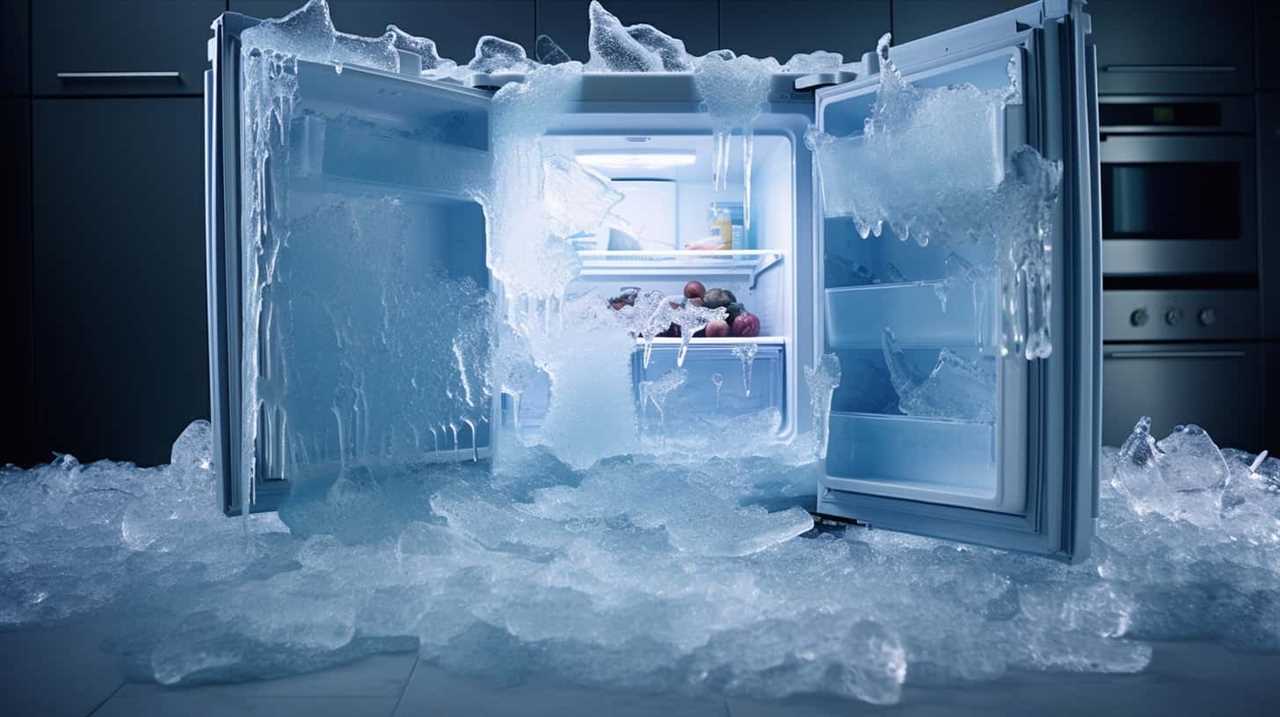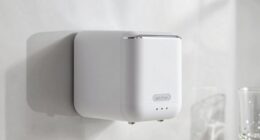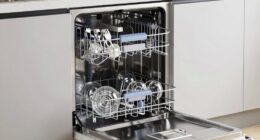Do you ever feel burdened by the duties of being a landlord? We understand the sentiment.
As landlords ourselves, we understand the importance of knowing exactly what appliances we are responsible for.
In this article, we will guide you through the ins and outs of landlord responsibilities when it comes to appliances. From refrigerators to microwaves, we’ve got you covered.
Get ready to master your role as a landlord and ensure your tenants have the best living experience possible.

Key Takeaways
- Landlords are responsible for ensuring refrigerators, stoves and ovens, dishwashers, and washing machines are in proper working condition throughout the tenancy.
- Tenants are responsible for basic maintenance tasks such as cleaning the stove and dishwasher, and regular maintenance and cleaning of washing machines.
- Landlords handle major repairs or replacements for appliances, including faulty burners, broken knobs, dishwasher mechanical issues, and washing machine mechanical issues.
- Prompt repairs and maintenance are necessary to create a comfortable living environment for tenants and avoid inconvenience.
Refrigerators
As landlords, we’re responsible for ensuring that refrigerators are in proper working condition throughout the tenancy. Proper refrigerator maintenance is essential to prevent common issues that may arise.
Regularly cleaning the refrigerator coils and checking the door seals for any leaks or cracks are important steps in maintaining the appliance. Troubleshooting common refrigerator issues such as a warm interior, excessive frost buildup, or unusual noises can help identify potential problems.
In case of a warm interior, the first step is to check the temperature settings and ensure they’re set correctly. Excessive frost buildup can be resolved by defrosting the refrigerator and cleaning the drainage pipe. Unusual noises may indicate a problem with the compressor or fan, which should be inspected by a professional.
Stoves and Ovens
We are also responsible for ensuring that stoves and ovens are in proper working condition throughout the tenancy. As landlords, it’s our duty to provide a safe and functional cooking environment for our tenants. While tenants are responsible for basic stove maintenance, such as cleaning and minor repairs, it’s ultimately our responsibility to handle any major repairs or replacements. This includes issues such as faulty burners, broken knobs, or malfunctioning heating elements. We understand the importance of a properly functioning stove and oven in a rental property, as it directly affects the tenant’s ability to cook and prepare meals. By promptly addressing any repair or maintenance needs, we aim to create a comfortable and convenient living environment for our tenants.
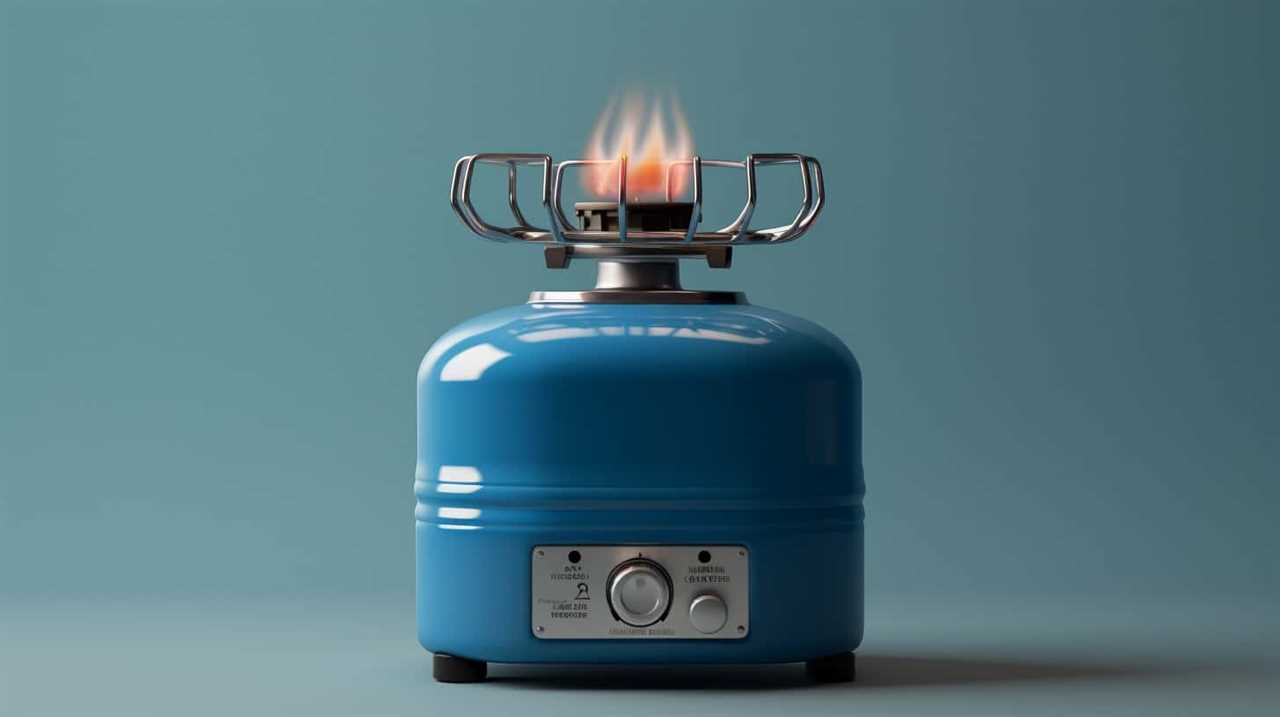
Now, let’s move on to discuss the next appliance that falls under our purview: dishwashers.
Dishwashers
When it comes to dishwashers, it’s important for tenants to understand their role in maintenance. Regularly cleaning the dishwasher, removing food debris, and using the appropriate detergent are all responsibilities of the tenant.
However, if the dishwasher stops working due to a mechanical issue or needs repairs, it’s the landlord’s responsibility to address the problem in a timely manner. In some cases, if the dishwasher is beyond repair, the landlord may need to replace it, which can be a significant cost.
Tenant Dishwasher Maintenance
Regularly cleaning and maintaining the dishwasher is the tenant’s responsibility to ensure efficient operation. Here are three essential maintenance tasks that tenants should perform:

- Clean the filter: The dishwasher’s filter traps food particles and debris, preventing them from clogging the drain. Regularly removing and cleaning the filter helps maintain proper drainage and prevents unpleasant odors.
- Check for blockages: Inspect the spray arms and nozzles for any clogs or obstructions. Clearing these blockages ensures that water can flow freely and effectively clean the dishes.
- Avoid overloading and proper loading: Overloading the dishwasher can strain its components and reduce its efficiency. Properly loading the dishwasher by following the manufacturer’s guidelines ensures optimal cleaning and prevents damage.
Landlord Repair Responsibility
In the case of dishwasher malfunctions due to normal wear and tear, it’s our responsibility as landlords to promptly repair or replace the appliance. As landlords, we understand the importance of a functioning dishwasher for our tenants. When a dishwasher breaks down, it can cause inconvenience and disrupt the daily routines of our tenants. Therefore, we prioritize tenant communication and ensure that repairs are carried out in a timely manner.
It’s crucial for us to maintain open lines of communication with our tenants to address any issues they may have with their dishwasher. Additionally, we want to assure our tenants that we’ve landlord insurance coverage to protect both parties in the event of any unforeseen damages or accidents related to the dishwasher.
Moving forward, let’s discuss the cost of dishwasher replacement.
Dishwasher Replacement Cost
As landlords, we’re responsible for covering the cost of replacing dishwashers that have worn out due to normal use. When it comes to replacing a dishwasher, it’s important to consider the cost of both the appliance itself and the installation process.

Here are three key points to keep in mind:
- Dishwasher installation process: The cost of installing a dishwasher can vary depending on factors such as the complexity of the plumbing, electrical work required, and any modifications needed to fit the new appliance. It’s best to hire a professional for this task to ensure proper installation and avoid any potential problems down the line.
- Common dishwasher problems: Dishwashers can experience issues such as leaks, clogged drains, and malfunctioning controls. While some problems can be fixed with simple repairs, others may require a complete replacement. It’s essential to assess the extent of the problem and determine if a replacement is necessary.
- Cost considerations: The cost of replacing a dishwasher can range from a few hundred to several thousand dollars, depending on factors such as the brand, features, and energy efficiency. It’s important to factor in the upfront cost as well as the long-term savings in terms of water and energy consumption when making a decision.
Washing Machines
When it comes to washing machines, landlords have specific maintenance obligations that they must fulfill. These obligations include ensuring that the washing machine is in proper working condition and addressing any repairs or replacements that may be necessary.
However, tenants also have responsibilities and rights when it comes to using the washing machine, such as properly maintaining and using it according to the manufacturer’s instructions.
In the event of a repair or replacement, the cost may be borne by either the landlord or the tenant, depending on the circumstances and the terms of the rental agreement.

Landlord Maintenance Obligations
We are responsible for the maintenance of washing machines as landlords. Ensuring that the washing machines in our rental properties are well-maintained is crucial to providing a comfortable living environment for our tenants.
Here are three key maintenance obligations we’ve as landlords:
- Regular cleaning and maintenance: We must clean the washing machines regularly to prevent the buildup of dirt, lint, and other debris. This includes wiping down the exterior, cleaning the detergent dispenser, and unclogging the drain hose.
- Troubleshooting and repairs: If a tenant reports a malfunctioning washing machine, we’re responsible for promptly addressing the issue. This may involve troubleshooting common problems like leaks or faulty controls and arranging for repairs or replacements when necessary.
- Preventive measures: To minimize the need for repairs, we should take preventive measures such as checking the hoses for leaks, inspecting the drum for signs of damage, and replacing worn-out parts proactively.
Tenant Responsibilities and Rights
To ensure the proper use and maintenance of washing machines, it’s important for tenants to understand their responsibilities and rights.
As a tenant, it’s your responsibility to use the washing machine in accordance with the manufacturer’s instructions. This includes not overloading the machine, using the appropriate detergent, and cleaning the lint filter regularly. If any issues arise with the washing machine, it’s your duty to report them promptly to the landlord or property management.

It’s also important to be aware of your rights as a tenant. If the washing machine becomes inoperable and the landlord fails to address the issue within a reasonable time frame, you may have the right to request a repair or replacement. In some cases, if the landlord consistently fails to provide a functioning washing machine, you may have grounds for eviction.
Additionally, when it comes to your security deposit, it’s crucial to document the condition of the washing machine before moving in and after moving out to ensure you aren’t held responsible for any damages that were preexisting.
Understanding your responsibilities and rights as a tenant regarding washing machines will help maintain a positive landlord-tenant relationship and ensure a smooth tenancy.
Repair and Replacement Costs
If the washing machine requires repair or replacement, the responsibility falls on the landlord. As a landlord, it’s important to understand the costs associated with repairing or replacing a washing machine and how to handle them.

Here are three important points to consider:
- Tenant reimbursement expenses: If the damage to the washing machine was caused by the tenant’s negligence or misuse, the landlord may be able to seek reimbursement for the repair or replacement costs. It’s crucial to clearly outline this in the lease agreement to avoid any confusion.
- Landlord appliance warranties: Some landlords may choose to purchase appliance warranties for their rental properties. These warranties can cover repair or replacement costs for appliances, including washing machines. It’s advisable to review the terms and conditions of the warranty and ensure it aligns with the specific needs of the rental property.
- Proactive maintenance: Regular maintenance and inspections of the washing machine can help identify potential issues before they become costly problems. Landlords should consider implementing a maintenance schedule to ensure the washing machine is in good working condition and reduce the likelihood of major repairs or replacements.
Dryers
Landlords are responsible for maintaining and repairing dryers in rental properties. As a landlord, it’s crucial to ensure that the dryer is in proper working condition for the tenant’s convenience and safety. While tenants are responsible for basic dryer maintenance, such as cleaning the lint trap and vent, it’s the landlord’s duty to handle any repairs or replacements that may arise.
This includes fixing issues with the heating element, motor, belts, or other mechanical components. Landlords should regularly inspect the dryer to identify any potential problems and address them promptly. It’s also important to provide clear guidelines to tenants regarding proper dryer usage and maintenance to prevent any avoidable damage.
Air Conditioning Units
One appliance that falls under our responsibility as landlords is the air conditioning unit. Maintaining and repairing air conditioning units is crucial for providing a comfortable living environment for our tenants.
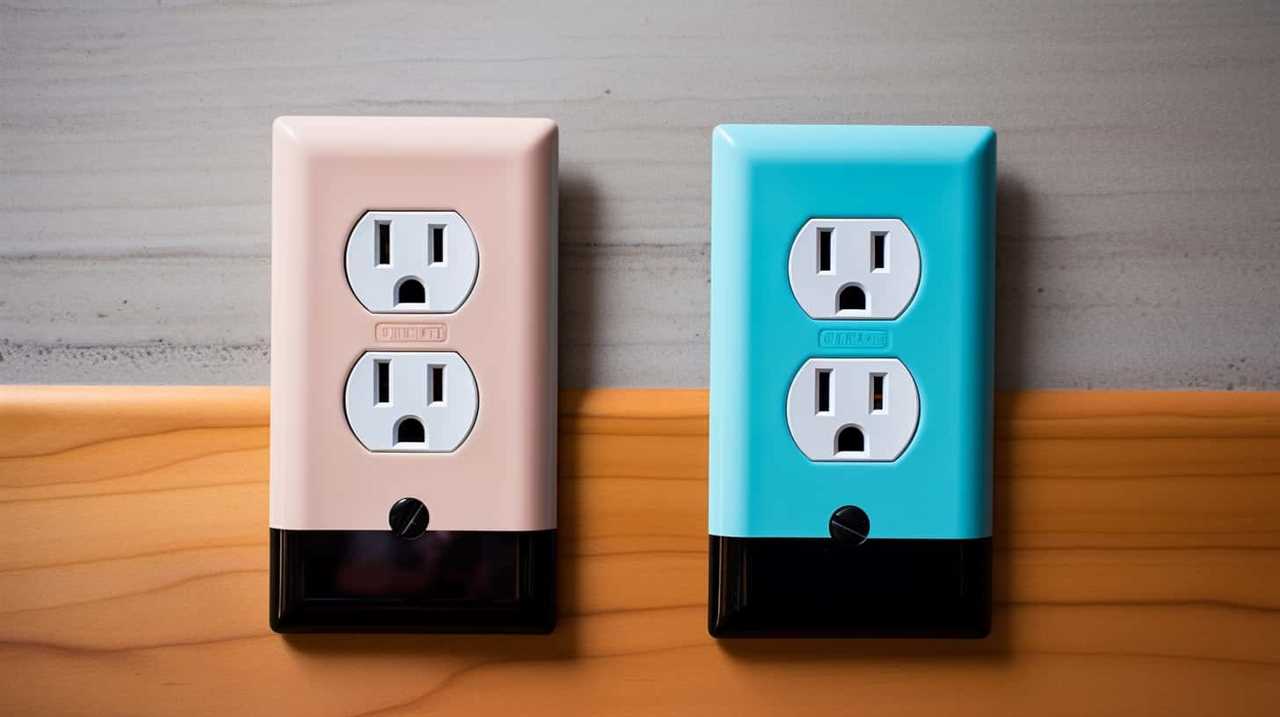
Here are three key aspects to consider regarding air conditioning maintenance and repair costs:
- Regular maintenance: As landlords, we should schedule regular maintenance for the air conditioning units in our properties. This includes cleaning filters, checking refrigerant levels, and inspecting the overall condition of the unit. Regular maintenance helps prevent major issues and prolongs the lifespan of the unit.
- Prompt repairs: If a tenant reports an issue with the air conditioning unit, it’s our responsibility to address it promptly. Delaying repairs can lead to further damage and higher repair costs. It’s important to have reliable technicians on hand to quickly resolve any issues that arise.
- Repair costs: Landlords are typically responsible for covering the repair costs of air conditioning units unless the damage is caused by tenant negligence. It’s important to budget for these costs and have a clear understanding of what’s included in the repair expenses.
Heating Systems
We regularly maintain and repair heating systems as responsible landlords. Proper heating is essential for the comfort and well-being of our tenants. When it comes to heating system installation, we ensure that it’s done correctly by professional technicians to guarantee optimal performance.
We understand the importance of regular heating system maintenance to prevent breakdowns and extend the lifespan of the equipment. This includes cleaning or replacing filters, checking the thermostat, inspecting ductwork, and addressing any issues promptly. We prioritize the safety of our tenants by ensuring that the heating system is operating efficiently and without any potential hazards.
By taking these proactive measures, we aim to provide a comfortable and safe living environment for our tenants.
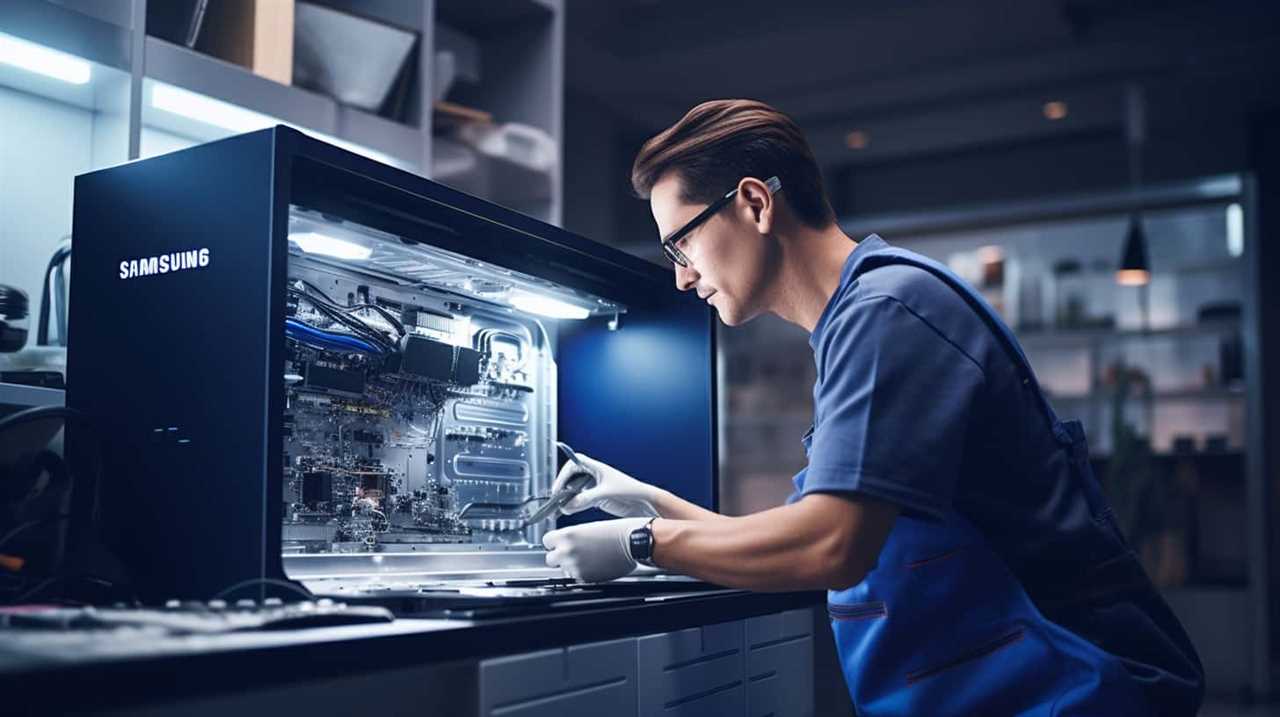
Now, let’s move on to discussing another vital appliance: water heaters.
Water Heaters
When it comes to water heaters, there are important points to consider for both tenants and landlords.
First, tenants are responsible for regular maintenance of the water heater, such as flushing the tank and checking for leaks.
However, landlords have an obligation to promptly repair any issues that arise with the water heater, as it’s considered a necessary and essential appliance.

In the event that the water heater needs replacement, it’s generally the landlord’s responsibility to provide a functioning unit for the tenant.
Tenant Water Heater Maintenance
Ensuring proper maintenance of water heaters falls under the landlord’s responsibility as part of providing a habitable living environment for tenants. Here are three important aspects of tenant water heater maintenance that landlords should be aware of:
- Regular Inspections: Landlords should schedule periodic inspections of the water heater to check for any leaks, corrosion, or other signs of damage. This helps identify potential issues early on and prevents costly repairs or replacements.
- Flushing and Cleaning: Sediment buildup can affect the efficiency and lifespan of a water heater. Landlords should advise tenants to regularly flush and clean the unit to remove any sediment or mineral deposits.
- Educating Tenants: It’s essential to educate tenants on proper usage and maintenance of the water heater. This includes setting the temperature to a safe level, avoiding excessive pressure on the system, and reporting any issues promptly.
By fulfilling their responsibility for tenant water heater maintenance, landlords can minimize the risk of breakdowns, extend the lifespan of the appliance, and reduce water heater replacement costs.
Moving on to landlord repair obligations…

Landlord Repair Obligations
As landlords, our responsibility includes repairing water heaters in a timely manner. When it comes to landlord repair obligations, water heaters are an essential appliance that requires our attention. It’s our duty to ensure that the water heater is functioning properly and providing hot water to our tenants.
Regular maintenance and timely repairs are crucial to avoid any inconvenience to the tenants. It’s important to address any issues promptly to prevent further damage and costly repairs.
Additionally, we should educate our tenants about proper dishwasher maintenance to prevent any potential damage to the water heater.
Water Heater Replacement?
What is our responsibility as landlords when it comes to water heater replacement?
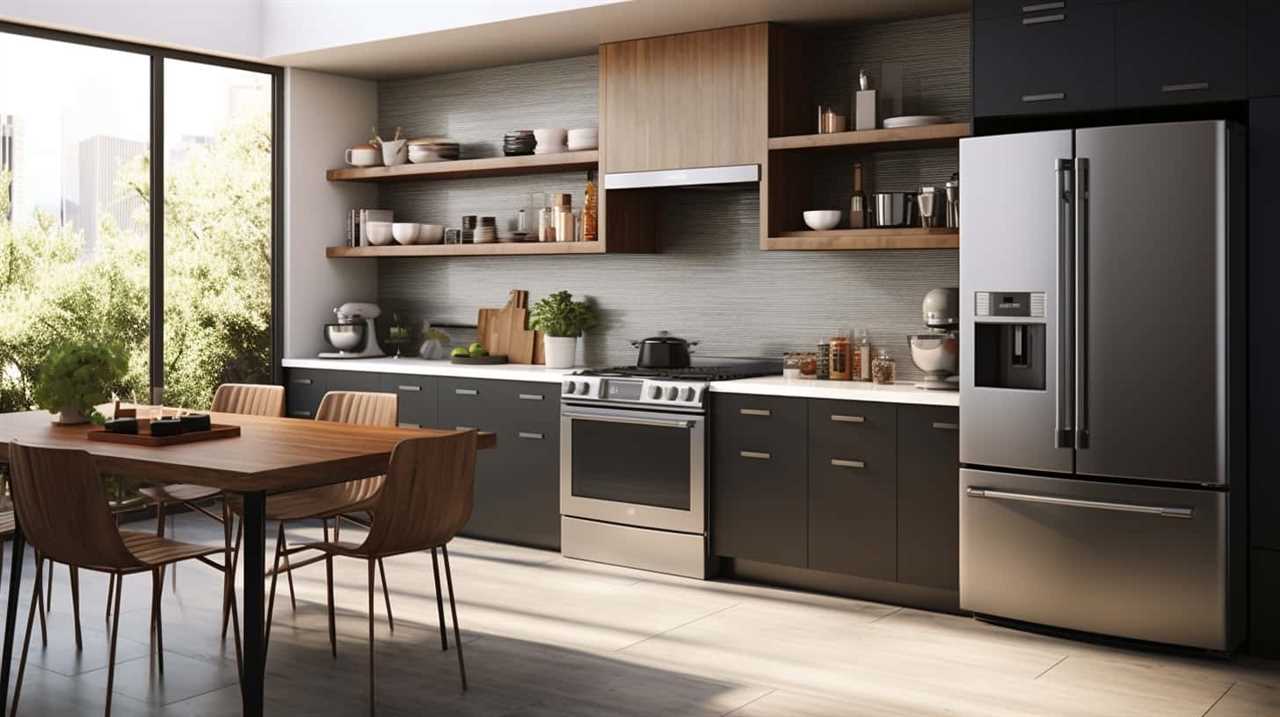
As landlords, we’re responsible for ensuring that the water heater in our rental property is in proper working condition. Here are some important points to consider:
- Regular maintenance: It’s essential to provide water heater maintenance regularly to extend its lifespan. This includes flushing the tank, checking for leaks, and inspecting the pressure relief valve.
- Signs of a failing water heater: As landlords, we should be aware of the signs that indicate a water heater is failing. These signs include rust-colored water, strange noises, insufficient hot water, and water leaks around the tank.
- Prompt replacement: If a water heater is beyond repair or has reached the end of its useful life, it’s our responsibility to promptly replace it to ensure our tenants have access to hot water.
Garbage Disposals
We are responsible for maintaining and repairing one garbage disposal in each rental unit. As landlords, it’s crucial to ensure that garbage disposals are installed correctly to avoid future problems. When installing a garbage disposal, it’s important to follow the manufacturer’s instructions precisely and ensure that all electrical connections are properly grounded.
Troubleshooting common garbage disposal issues is also part of our responsibility. This includes addressing problems such as clogged blades, jammed motors, or leaks. If tenants encounter any of these issues, we should promptly inspect and repair the garbage disposal to maintain a functional and efficient kitchen.
Now, let’s move on to the next section, where we’ll discuss the responsibilities we have regarding microwave ovens.
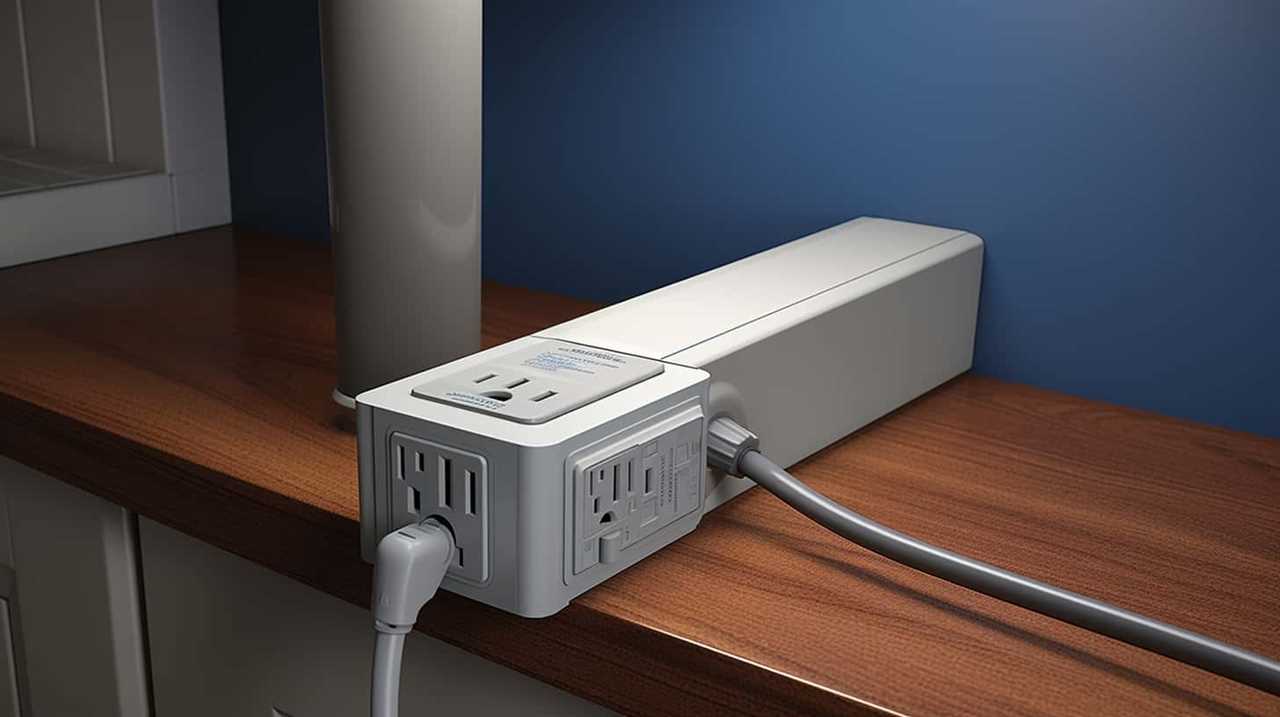
Microwave Ovens
Now let’s move on to our responsibility for maintaining and repairing the microwave ovens in each rental unit. As landlords, it’s crucial to ensure that the microwave ovens are in proper working condition, as they’re an essential appliance for tenants.
Here are three key aspects of microwave oven maintenance and troubleshooting microwave issues:
- Regular cleaning: Encourage tenants to clean the microwave regularly to prevent the buildup of grease and food particles. This won’t only maintain hygiene but also extend the lifespan of the appliance.
- Addressing common problems: Educate tenants on common microwave issues such as power failure, faulty buttons, and uneven heating. Provide them with troubleshooting tips or contact information for repairs to resolve these problems promptly.
- Professional repairs: If the microwave oven requires professional attention, promptly arrange for a qualified technician to inspect and repair the appliance. This will ensure the safety and satisfaction of your tenants.
Frequently Asked Questions
Can Tenants Request a Specific Brand or Model of Appliance to Be Provided by the Landlord?
We cannot request specific brands or models of appliances from our landlord. It is our responsibility to use the appliances provided responsibly and report any issues promptly.
Are Landlords Responsible for Repairing or Replacing Appliances if They Break Down Due to Tenant Misuse?
When appliances break down due to tenant misuse, it is important to assess tenant liability. However, as landlords, we are responsible for repairing or replacing appliances if they are included in our responsibilities as outlined in the lease agreement.
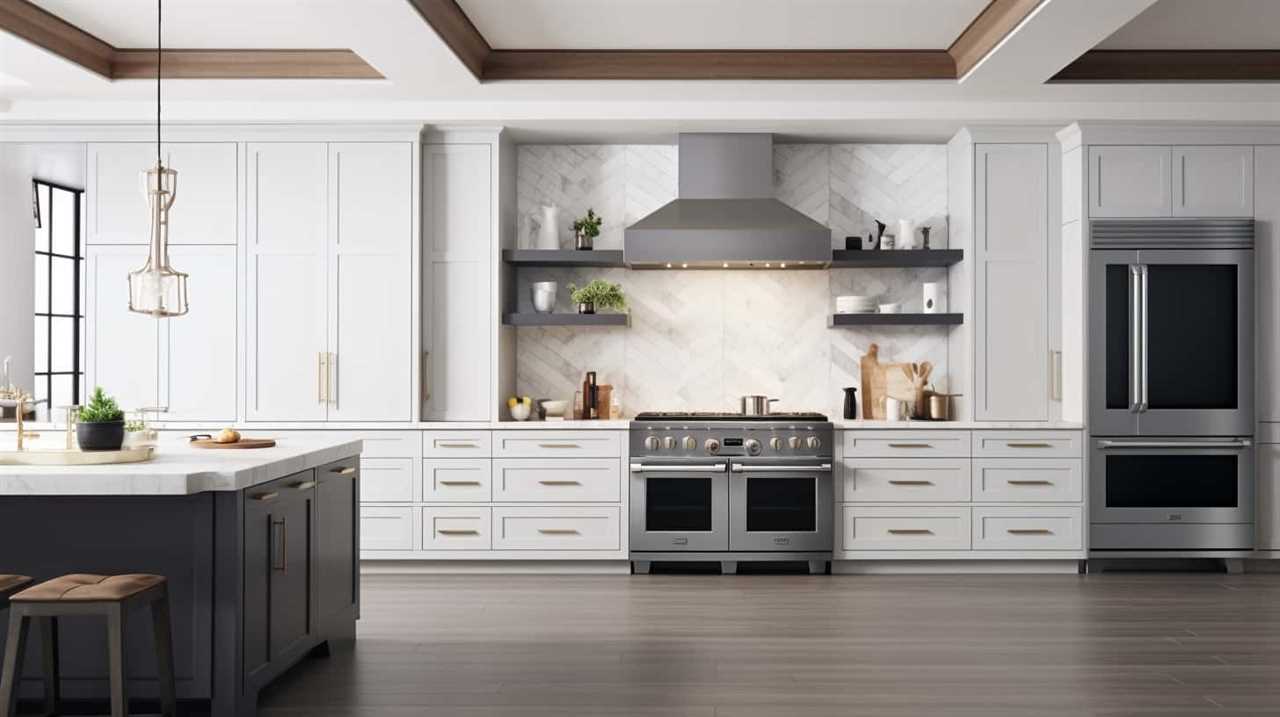
Can Landlords Charge Tenants for Maintenance or Repairs of Appliances?
Landlords can charge tenants for maintenance or repairs of appliances if specified in the lease agreement. However, it is important to clarify the terms and conditions beforehand to avoid any disputes or misunderstandings.
Are Landlords Required to Provide Appliances in the Rental Property or Can Tenants Bring Their Own?
Renting without appliances has its pros and cons. While tenants have the freedom to bring their own, landlords are not legally required to provide them. This alternative option allows for customization, but tenants are responsible for maintenance and repairs.
Can Landlords Require Tenants to Pay for the Electricity or Gas Used by the Appliances Provided?
Landlords can require tenants to pay for the electricity or gas used by the appliances provided. However, the specific terms should be outlined in the rental agreement to avoid any confusion or disputes.
Conclusion
In conclusion, landlords are responsible for providing and maintaining essential appliances in rental properties.

While some may argue that tenants should be responsible for these appliances, it’s crucial to consider the emotional impact of not having these basic necessities.
By ensuring that appliances like refrigerators, stoves, and heating systems are in proper working condition, landlords can create a comfortable and safe living environment for their tenants, fostering a sense of security and well-being.


